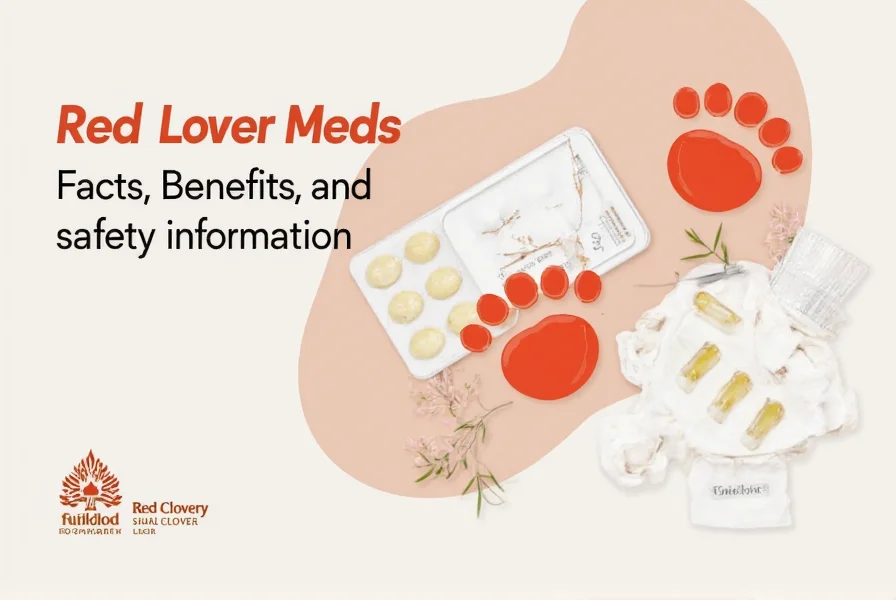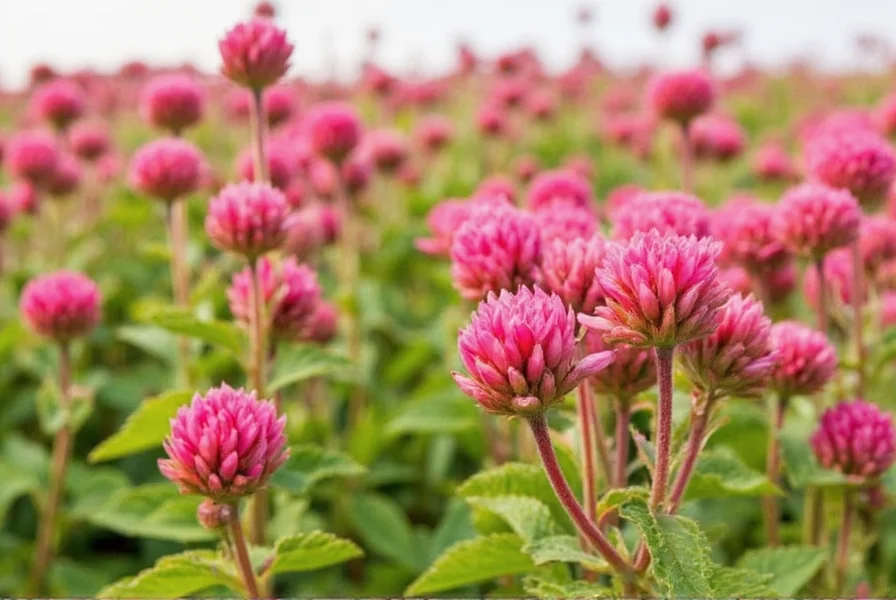"Clover meds" typically refers to red clover (Trifolium pratense) used in herbal medicine, not a prescription medication. Red clover contains isoflavones that act as phytoestrogens and has been traditionally used for menopausal symptoms, skin conditions, and respiratory issues. Scientific evidence supporting its efficacy is limited, with mixed results from clinical studies. Always consult a healthcare provider before using red clover supplements, especially if taking blood thinners or hormone-related medications, as it may cause interactions.
Red clover has gained attention in natural health circles as an alternative remedy, but understanding its actual benefits and limitations is crucial for safe usage. This comprehensive guide examines the scientific evidence behind red clover's medicinal applications, proper usage guidelines, and important safety considerations.
Understanding Red Clover as a Medicinal Herb
Red clover (Trifolium pratense) is a flowering plant native to Europe, Western Asia, and northwest Africa, now naturalized throughout North America. Unlike prescription medications, red clover is classified as a dietary supplement in most countries, meaning it doesn't undergo the same rigorous testing and approval processes as pharmaceutical drugs.
The primary active compounds in red clover are isoflavones—including biochanin A, formononetin, daidzein, and genistein—which function as phytoestrogens. These plant-based compounds can mimic estrogen in the body, which explains red clover's traditional use for hormone-related conditions. However, the concentration of these compounds varies significantly between products, making standardization challenging for natural health practitioners researching clover-based remedies.

Historical Medicinal Applications
Traditional medicine systems have utilized red clover for centuries. Native American tribes used it for respiratory conditions and skin disorders, while European herbalists incorporated it into "blood purifying" formulas. By the 19th century, red clover became a staple in Eclectic medicine for treating whooping cough, bronchitis, and inflammatory skin conditions.
Unlike modern pharmaceutical development, these historical uses weren't based on clinical trials but rather on observational evidence passed through generations. This historical context helps explain why some natural health practitioners continue recommending red clover for similar conditions today, though contemporary research provides a more nuanced understanding of its actual effectiveness.
Scientific Evidence on Red Clover Benefits
Current research on red clover presents a mixed picture. Several studies have investigated its potential benefits:
| Health Condition | Research Findings | Evidence Strength |
|---|---|---|
| Menopausal Symptoms | Some reduction in hot flashes reported, but results inconsistent across studies | Moderate |
| Cardiovascular Health | Potential improvement in arterial flexibility, minimal effect on cholesterol | Preliminary |
| Bone Density | Some evidence of slowing bone loss in postmenopausal women | Limited |
| Skin Conditions | Traditional use for psoriasis and eczema lacks strong clinical evidence | Weak |
A 2020 systematic review published in Phytotherapy Research concluded that while red clover shows promise for managing menopausal symptoms, the evidence remains insufficient to recommend it as a standard treatment. The review noted significant variability in study methodologies and product formulations, making definitive conclusions challenging for healthcare providers evaluating natural alternatives to conventional medications.
Safety Profile and Potential Interactions
Red clover is generally considered safe for short-term use (up to 12 months), but several important safety considerations exist:
- Blood thinning effects: May increase bleeding risk, especially when combined with anticoagulants like warfarin
- Hormone-sensitive conditions: Contraindicated for individuals with breast cancer, endometriosis, or uterine fibroids
- Surgery considerations: Should be discontinued at least two weeks before surgical procedures
- Pregnancy and breastfeeding: Not recommended due to potential hormonal effects
Unlike prescription medications with standardized dosing, red clover supplements vary widely in potency. A 2019 analysis by the American Botanical Council found up to 300% variation in isoflavone content between different red clover products labeled with identical dosages. This inconsistency represents a significant challenge for consumers seeking reliable information about natural clover-based treatments.

Practical Guidance for Safe Usage
If considering red clover as part of your wellness regimen, follow these evidence-based recommendations:
- Consult your healthcare provider before starting, especially if managing chronic conditions or taking medications
- Choose standardized products that specify isoflavone content (typically 40-80mg isoflavones daily)
- Start with lower doses to assess tolerance before increasing
- Monitor for side effects including headache, nausea, or muscle aches
- Limit continuous use to 6-12 months with breaks in between
When researching natural alternatives to prescription medications, look for products verified by independent third parties like USP, NSF, or ConsumerLab. These certifications don't guarantee effectiveness but provide assurance of product purity and accurate labeling—critical considerations when exploring herbal options like red clover remedies.
Red Clover in Context: Complementary Approach
Red clover should be viewed as a potential complementary approach rather than a replacement for conventional medical treatments. For conditions like menopausal symptoms, a comprehensive strategy might include:
- Lifestyle modifications (diet, exercise, stress management)
- Evidence-based supplements (like red clover, when appropriate)
- Conventional treatments when necessary
- Regular monitoring by healthcare professionals
The most effective natural health strategies incorporate multiple approaches rather than relying on single remedies. When evaluating information about clover-based medicinal products, prioritize sources that acknowledge both potential benefits and limitations rather than those making absolute claims about effectiveness.
Conclusion: Informed Decision-Making
"Clover meds" represents a category of herbal remedies with historical significance but limited scientific validation. While red clover shows potential for certain applications, particularly regarding menopausal symptoms, it shouldn't be viewed as a miracle cure. The most responsible approach involves understanding both the potential benefits and limitations of red clover, consulting healthcare professionals, and making informed decisions based on individual health circumstances.
As research continues to evolve, staying updated with evidence-based information remains essential for anyone considering red clover or other herbal remedies as part of their health regimen. The growing interest in natural alternatives to conventional medications underscores the importance of critical evaluation when exploring options like red clover supplements.
Frequently Asked Questions
Is red clover the same as prescription medications for menopause?
No, red clover is not equivalent to prescription hormone therapy. While both may address menopausal symptoms, prescription medications undergo rigorous testing and standardization that herbal supplements like red clover do not. Red clover contains phytoestrogens that may provide mild symptom relief for some women, but it's not a substitute for medically supervised hormone replacement therapy.
How long does it take to see results from red clover supplements?
Most studies suggest it may take 4-12 weeks of consistent use to potentially notice effects from red clover supplements, particularly for menopausal symptoms. However, individual responses vary significantly, and some people may not experience noticeable benefits. Unlike prescription medications with predictable timelines, herbal remedies like red clover have more variable response rates.
Can I take red clover with my blood pressure medication?
Red clover may interact with certain blood pressure medications, potentially enhancing their effects and causing blood pressure to drop too low. Always consult your healthcare provider before combining red clover with any prescription medications, including blood pressure drugs. They can assess potential interactions based on your specific medications and health status.
What's the difference between red clover and white clover for medicinal use?
Red clover (Trifolium pratense) contains higher concentrations of isoflavones compared to white clover (Trifolium repens), making it the preferred species for medicinal applications. Most research on clover's health benefits focuses specifically on red clover, while white clover has minimal documented medicinal use. When selecting clover-based remedies, ensure you're getting authentic red clover products.











 浙公网安备
33010002000092号
浙公网安备
33010002000092号 浙B2-20120091-4
浙B2-20120091-4